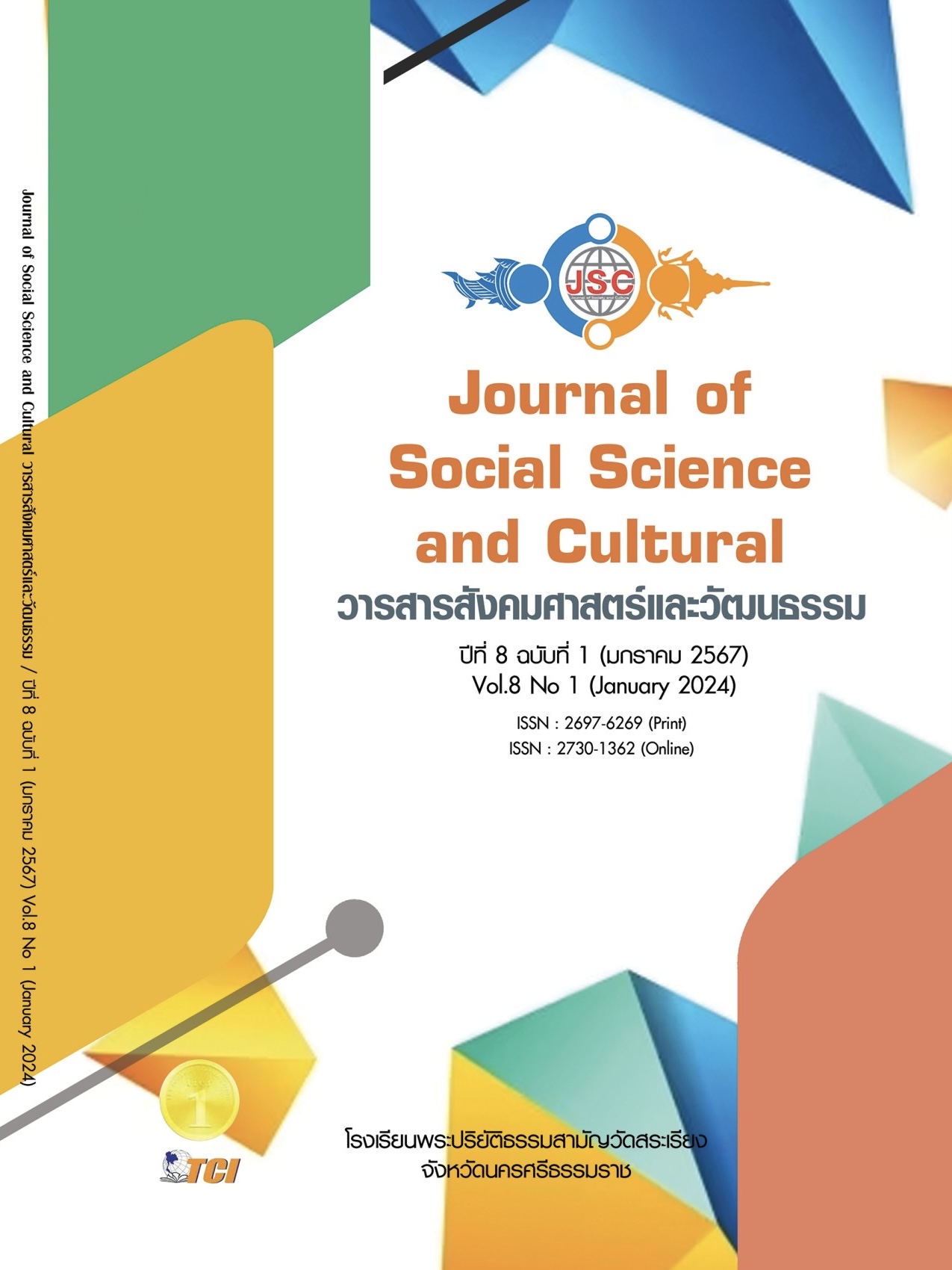THE CURRICULUM DEVELOPMENT OF ENGLISH ENRICHMENT COURSE ENHANCING INTERCULTURAL AND CREATIVE COMMUNICATION SKILLS FOR UPPER-SECONDARY STUDENTS
Main Article Content
Abstract
The study aims to 1) develop an English Enrichment Course curriculum enhancing intercultural and creative communication skills for upper-secondary students and 2) investigate the efficiency of the curriculum. This study was employed the research and development process comprising of four main phases including 1) researching essential information for curriculum development, 2) drafting the curriculum, 3) implementing the developed curriculum, and 4) evaluating the efficacy of the curriculum. The sample consisted of 36 Grade 10 students in the second semester of academic year of 2022, selected through purposive sampling. The duration of the study was 16 weeks. The research instruments included 1) the curriculum for the English Enrichment course, focusing on intercultural and creative communication skills for upper-secondary students, 2) pretest and posttest assessments covering three main aspects: knowledge and understanding, emotions and feelings, and behaviors and practices, and 3) a satisfaction survey questionnaire regarding the curriculum. Descriptive statistics, such as frequency, percentage, mean, standard deviation, and dependent t-tests, were employed for data analysis. The findings indicated that 1) the developed curriculum consisted of seven main elements and four learning units with the appropriateness consistency level between 0.80 – 1.00, 2) the efficacy of the developed curriculum was that the posttest scores were higher than the pretest at a statistically significance level at .05 and exceeded the percentage of 80, and overall, students expressed high satisfaction with the curriculum ( = 4.29)
Article Details
References
กระทรวงศึกษาธิการ. (2553). หลักสูตรแกนกลางการศึกษาขั้นพื้นฐาน พุทธศักราช 2551. กรุงเทพมหานคร: โรงพิมพ์ชุมนุมสหกรณ์การเกษตรแห่งประเทศไทย จำกัด.
กุลพร หิรัญบูรณะ. (2556). Intercultural Communication: Globalization and Social Justice. ภาษาปริทัศน์, 12(3), 111-116.
จินตนา วีระปรียากูร. (2560). การพัฒนาโมเดลสภาพแวดล้อมการจัดการเรียนการสอนภาษาอังกฤษเพื่อการสื่อสารแบบผสมผสาน ด้วยกระบวนการเรียนรู้เชิงรุก เพื่อส่งเสริมทักษะในการสื่อสารเชิงสร้างสรรค์ และทักษะการทำงานร่วมกันของนักศึกษาระดับปริญญาตรี. ใน ดุษฎีนิพนธ์ปรัชญาดุษฎีบัณฑิต สาขาเทคโนโลยีและสื่อสารการศึกษา. มหาวิทยาลัยมหาสารคาม.
จินตวีร์ เกษมสุข. (2554). การสื่อสารกับการเปลี่ยนแปลงของสังคม. กรุงเทพมหานคร: จุฬาลงกรณ์ มหาวิทยาลัย.
ชวลิต ชูกำแพง. (2551). การพัฒนาหลักสูตร. มหาสารคาม: สำนักพิมพ์มหาวิทยาลัยมหาสารคาม.
ผะอบ พวงน้อย. (2558). การพัฒนาหลักสูตรและชุดสื่อการเรียนรู้ เรื่อง ภาษาอังกฤษเทคนิคเพื่อการท่องเที่ยวเมืองไทยในวิถีพุทธ. วารสารวิชาการพระจอมเกล้าพระนครเหนือ, 25(1), 137-147.
วิชัย วงษ์ใหญ่. (2551). กระบวนการพัฒนาหลักสูตรและการเรียนการสอนภาคปฏิบัติ. กรุงเทพมหานคร: สุวีริยาสาส์น.
Asakereh, A., & Dehghannezhad, M. (2015). Student satisfaction with EFL speaking classes: Relating speaking self-efficacy and skills achievement. Educational Research, 25(4), 345-363.
Brislin, R.W. . (1989). Intercultural communication training. In M.K. Asante & W.B. Gudykunst (Eds.), Handbook of International and Intercultural Communication (pp. 441-457). California: Sage Publications.
Brown, J.D. (1995). The elements of language curriculum: A systematic approach to program development. USA: Heinle&Heinle publishers.
Connors, J. V. . (2013). Getting through: Keys to constructive communication. Desert Exposure, 17(2013b), 37-39.
He, Y., & Fu, X. . (2022). Learning Satisfaction of Learners and Curriculum Design under Different Online Teaching Platforms. International Journal of Emerging Technologies in Learning (iJET), 17(10), 227-239.
Liu, S., & Dall’Alba, G. . (2012). Learning intercultural communication through group work oriented to the world beyond the classroom. Assessment & Evaluation in Higher Education, 37(1), 19-32.
Richards, J. C. . (2001). Curriculum Development in Language Teaching Cambridge Professional Learning. Cambridge: Cambridge University Press.
Storey, C. W. . (2007). Insights into Language Curriculum Development. Electronic Journal of Foreign Language Teaching, 4(1). 86-107.
Taba, H. . (1962). Curriculum Development: Theory and Practice. New York: Harcourt, Brace and World.


